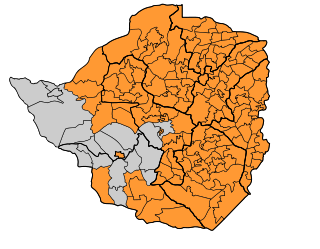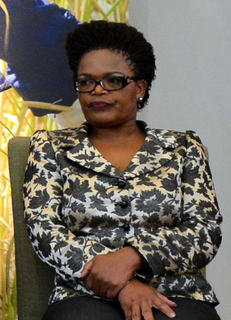
The foreign relations of Zimbabwe emphasize a close relationship with the People's Republic of China and South Africa, nations with close economic ties to Zimbabwe.

Harare is the capital and most populous city of Zimbabwe. The city proper has an area of 960.6 km2 (371 mi2) and an estimated population of 1,606,000 in 2009, with 2,800,000 in its metropolitan area in 2006. Situated in north-eastern Zimbabwe in the country's Mashonaland region, Harare is a metropolitan province, which also incorporates the municipalities of Chitungwiza and Epworth. The city sits on a plateau at an elevation of 1,483 metres above sea level and its climate falls into the subtropical highland category.

The Zimbabwe African National Union – Patriotic Front (ZANU–PF) is a political organization which has been the ruling party of Zimbabwe since independence in 1980. The party was led for many years under Robert Mugabe, first as Prime Minister with the Zimbabwe African National Union (ZANU) and then as President from 1987 after the merger with the Zimbabwe African People's Union (ZAPU) and retaining the name ZANU–PF, until 2017, when he was removed as leader.

The Southern Africa-Indian Ocean Division (SID) of Seventh-day Adventists is a sub-entity of the General Conference of Seventh-day Adventists, which coordinates the Church's activities in the southern portion of Africa, which include the nations of Angola, Ascension Island, Botswana, Comoro Islands, Lesotho, Madagascar, Malawi, Mauritius, Mozambique, Namibia, Réunion, São Tomé and Príncipe, Seychelles, South Africa, Swaziland, Zambia, Zimbabwe; as well as St. Helena and Tristan da Cunha, territories of the United Kingdom, and the Kerguelen Islands, territory of France. Its headquarters is in Johannesburg, South Africa. The Division membership as of June 30, 2018 is 3,969,099.
.zw (zimbabwe) is the Internet country code top-level domain (ccTLD) for Zimbabwe.
The Central Intelligence Organisation (CIO) is the national intelligence agency or "secret police" of Zimbabwe. It was conceived as the external intelligence-gathering arm of the British South Africa Police Special Branch in the early 1960s, under Southern Rhodesian prime minister Winston Field.
Zimbabweans in the United Kingdom are people who have migrated from Zimbabwe to the UK and their descendants. The Zimbabwean community in the UK is diverse, consisting of individuals of differing racial, ethnic, class, and political groups. There are asylum seekers, refugees, labour migrants, students, undocumented migrants, and others who have gained British citizenship.
The Internet in Zimbabwe has seen rapid expansion in recent years. The Internet country code top-level domain is .zw. In 2009, the Mugabe-Tsvangirai Government of National Unity established a Ministry of Information and Communications Technology to focus on ICT growth and development.

Robert Gabriel Mugabe was a Zimbabwean revolutionary and politician who served as Prime Minister of Zimbabwe from 1980 to 1987 and then as President from 1987 to 2017. He chaired the Zimbabwe African National Union (ZANU) group from 1975 to 1980 and led its successor political party, the ZANU – Patriotic Front (ZANU–PF), from 1980 to 2017. Ideologically an African nationalist, during the 1970s and 1980s he identified as a Marxist–Leninist, and as a socialist after the 1990s. His policies have been described as Mugabeism.
ISO 3166-2:ZW is the entry for Zimbabwe in ISO 3166-2, part of the ISO 3166 standard published by the International Organization for Standardization (ISO), which defines codes for the names of the principal subdivisions of all countries coded in ISO 3166-1.

The 2008 Zimbabwean cholera outbreak was an epidemic of cholera affecting much of Zimbabwe from August 2008 until June 2009. The outbreak began in Chitungwiza in Mashonaland East Province in August 2008, then spread throughout the country so that by December 2008, cases were being reported in all 10 provinces. In December 2008, The Zimbabwean government declared the outbreak a national emergency and requested international aid. The outbreak peaked in January 2009 with 8,500 cases reported per week. Cholera cases from this outbreak were also reported in neighboring countries South Africa, Malawi, Botswana, Mozambique, and Zambia. With the help of international agencies, the outbreak was controlled, and by July 2009, after no cases had been reported for several weeks, the Zimbabwe Ministry of Health and Child Welfare declared the outbreak over. In total, 98,596 cases of cholera and 4,369 deaths were reported, making this the largest outbreak of cholera ever recorded in Zimbabwe. The large scale and severity of the outbreak has been attributed to poor sanitation, limited access to healthcare, and insufficient healthcare infrastructure throughout Zimbabwe.

Greek Zimbabweans comprise about 2,500 people of Greek origin, almost half of them from the island of Cyprus. Zimbabwe currently hosts eleven Greek Orthodox churches and fifteen Greek associations and humanitarian organizations.

Beatrice Mtetwa is a Swazi born and naturalised Zimbabwean lawyer who has been internationally recognized for her defense of journalists and press freedom. The New York Times described her in 2008 as "Zimbabwe's top human rights lawyer".

Zimbabwean Americans are Americans of full or partial Zimbabwean ancestry. The Zimbabwean communities are localized, between other places, in California and Texas.
The Miss Zimbabwe is a national Beauty pageant in Zimbabwe.
Zimbabwean Canadians are Canadian citizens of Zimbabwean descent or a Zimbabwe-born person who resides in Canada. According to the Canada 2011 Census there were 6,425 Canadian citizens who claimed Zimbabwean ancestry and 5,065 Zimbabwean citizens residing in the country at the moment of the census.
Water supply and sanitation in Zimbabwe is defined by many small scale successful programs but also by a general lack of improved water and sanitation systems for the majority of Zimbabwe. According to the World Health Organization in 2012, 80% of Zimbabweans had access to improved, i.e. clean, drinking-water sources, and only 40% of Zimbabweans had access to improved sanitation facilities. Access to improved water supply and sanitation is distinctly less in rural areas. There are many factors which continue to determine the nature, for the foreseeable future, of water supply and sanitation in Zimbabwe. Three major factors are the severely depressed state of the Zimbabwean economy, the willingness of foreign aid organizations to build and finance infrastructure projects, and the political stability of the Zimbabwean state.

Mexico–Zimbabwe relations refers to the diplomatic relations between the United Mexican States and the Republic of Zimbabwe. Both nations are members of the Group of 15 and the United Nations.












